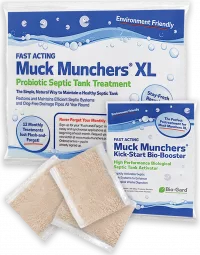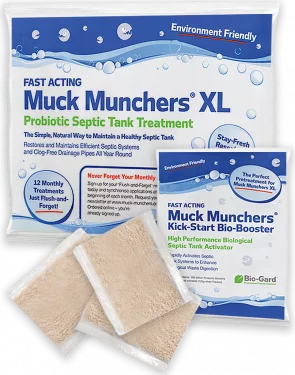What Are Septic Tank Additives and Do They Matter?
If you’ve spent any time managing a septic tank or one of the newer bio package sewage treatment plants you may already be aware of septic tank additives.
Septic tank additives can confuse people. This is because there are two different types of septic tank additives:
- Natural biological additives
- Harsh chemical additives.
Both can be used to increase the breakdown in your drains and septic tank system.
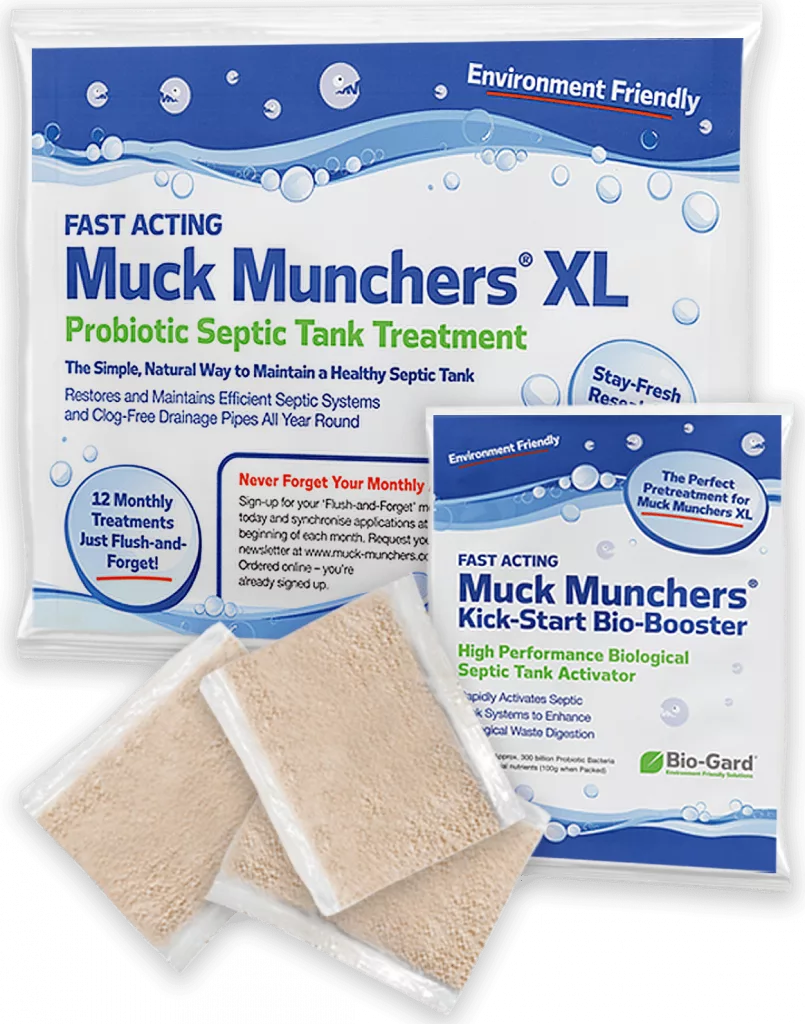
Septic tank bacteria additives such as Muck Munchers are biological. We recommend using biological additives – anything chemical or artificial is at risk of causing your existing bacteria more harm than good. So, yes, septic tank additives do matter and in the course of this article, we investigate how microbes and septic tank enzymes work, together with the benefits that can be achieved by adding biological additives to your own septic tank and system.
Do Septic Tank Additives Really Work?
Research data from Beverley Analytical Laboratories, My Home Farm and our own studies here at Bio-Gard clearly show that introducing Muck Munchers into your septic tank significantly improve the waste breakdown and aid improved drainage efficiency.
Simulated Septic Tank Digestion Study
The laboratory scale utilised a treatment with formulation MM3 (Muck Munchers)aiming to obtain COD (Chemical Oxygen Demand) reduction, bacterial survival rate, cellulose degradation and scum layer degradation.
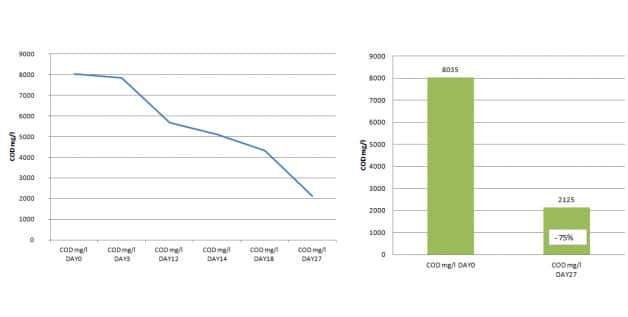
As this graphic shows, the bacteria in MM3 reduced the COD level by about 75% of the initial value, in the first 4 weeks, confirming the positive effect of this formulation in breaking down 3/4 of the organic waste.
Let’s take a quick look into the science of the data. The data below is from another study. After just a four-week period of using Muck Munchers, data shows that Biological Oxygen Demand (BOD) and Chemical Oxygen Demand (COD) in septic tank conditions are lower.
A lower BOD indicates that bacteria are not struggling for air, and that the septic tank is working effectively. The low COD, indicates that digestion has dramatically improved.
In the study, there is a ratio of 1:3 BOD to COD, showing that waste is being munched much more readily along with an indication that dissolved solids reduced by up to 28%.
What does this mean? The data shows that that Muck Munchers are chewing-up more waste and therefore are making a septic tank much more efficient.
What’s more, there is a significant downturn in the ammonia found across a four-week period. Ammonia levels in the tested sample decreased by up to a third – indicating that plant nutrient nitrates in the mix are building as ammonia is reduced and that digestion is speeding up.
Additionally, the study shows that Muck Munchers were able to clear up to 75% of waste during a four-week programme. No extra waste was added in this study. This demonstrates that Muck Munchers has a huge positive effect on digesting septic tank waste.
Of course, there are sceptics who question how useful additives can actually be. In fact, there are some who will claim biological additives are unnecessary.
Given our data, there can be little doubt. The best thing you can do is give your tank a head-start. Don’t wait until sludge levels to build up and fester. Introducing a proven biological septic waste digester, such as Muck Munchers will reduce pump outs. Your tank will thank you, and so will your bank balance!
How Do Biological Septic Tank Enzymes Work?
Adding biological additives to your septic tank will provide your waste with additional microbes to effectively ‘munch’ through more of the sewage.
Biological additives arrive in the form of bacteria, like our own. In a properly formulated waste treatment additive, there will be a broad spectrum of healthy microbes, together with essential nutrients to help them both multiply and produce enzymes.
Each species of microbe produces enzymes to target different types of waste. These are primarily:
- Protein (poo etc.)
- Cellulose (paper and vegetable waste)
- Fats, oils and greases
- Starches and sugars.
That said, Muck Munchers or other additives will only work exceptionally well if you also only flush the right things and actively care for your septic tank.
A Simple 3 Step Explanation of How Enzymes Work
- Bacteria produce enzymes to target waste
- The enzymes cut pieces out of bigger waste molecules
- Bacteria then digest the smaller molecules
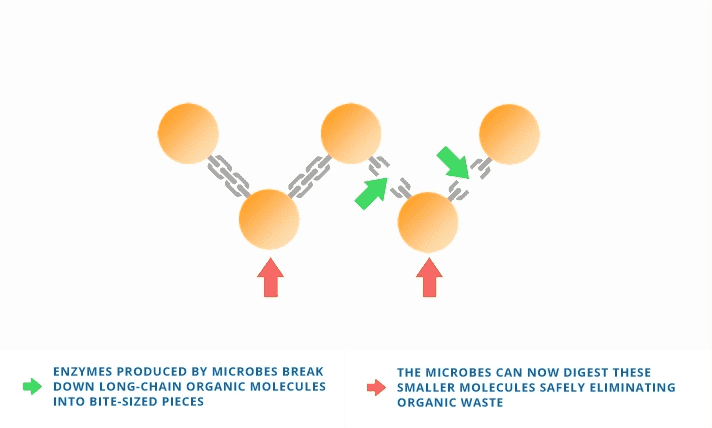
Diagram showing how enzymes work
Will Septic Tank Additives Benefit my Soakaway?
Yes, Biological additives can certainly benefit your soakaway, providing you also take a little care to maintain your septic tank.
Soakaways that are clogged or damaged due external factors, such as high salt in the water, and due to an inefficient aerobic / anaerobic bacterial balance, may need additional care and support in time.
Bacterial additives such as Muck Munchers can help to lessen the strain on your soakaway, simply by digesting waste in the tank or treatment plant, reducing effluent discharges.
If your septic tank is not breaking down those organic solids, you may likely need to consider pumping more frequently. You’ll always need a pump out at some point – but many Muck Munchers customers reduce pump-outs to just once every several.
With more effective digestion in the septic tank, and less organic effluent entering the soakaway, both waste digestion in the drain field and the rate of drainage are both more effective. The reason is that with limited oxygen in soakaways, if there is less waste, it is easier for bacteria to stay aerobic. That’s important because aerobic bacteria are massively more effective than their anaerobic cousins, plus anaerobic bacteria are prone to create a biofilm that inhibits drainage.
Providing you use a proven biological additive you should experience great results, more protection for your soakaway and drive down sludge and solids’ build-up. In the end that all adds up to fewer pump-outs and less likelihood that you soakaway will become blocked or damaged.
How Do I Increase Bacteria in My Septic Tank?
Bacteria will always thrive to some extent in a septic tank providing you continue to flush waste into it. It’s a natural process that won’t die off unless you introduce harmful chemicals, if the septic tank is damaged, or if you flush anything that you shouldn’t. In such cases you are at risk of destroying the bacteria.
If you want help to replace or enhance the bacteria population without overpowering your septic tank, Muck Munchers is a perfect solution. It’s a biological additive that will effectively improve the efficiency of your whole sewage breakdown operation in the tank and soakaway. It’s also perfect to use immediately after a pump-out, simply because Muck Munchers comes with a special Kick-Start Bio-Booster to rapidly deploy a large bacterial population to ensure almost immediate results.
As a preventative measure, Muck Munchers helps save money and stress in the long-run, cutting down the number of pump-outs. Regularly topping-up the additive on a monthly basis will help keep your tank ‘regular.
So, Are Septic Tank Additives Necessary?
Ultimately, providing you flush the right things into your septic system and look after your septic tank, you may not always need to use a septic tank additive. However, in modern households the level of contaminants discharged, including chemicals, food waste, cooking fats, create a constant threat to bacteria in the septic system. That’s why for the high-performance additives like Muck Munchers are a common-sense money-saving solution.
You owe your septic tank bacteria a great deal – for without them, that waste is going nowhere!
